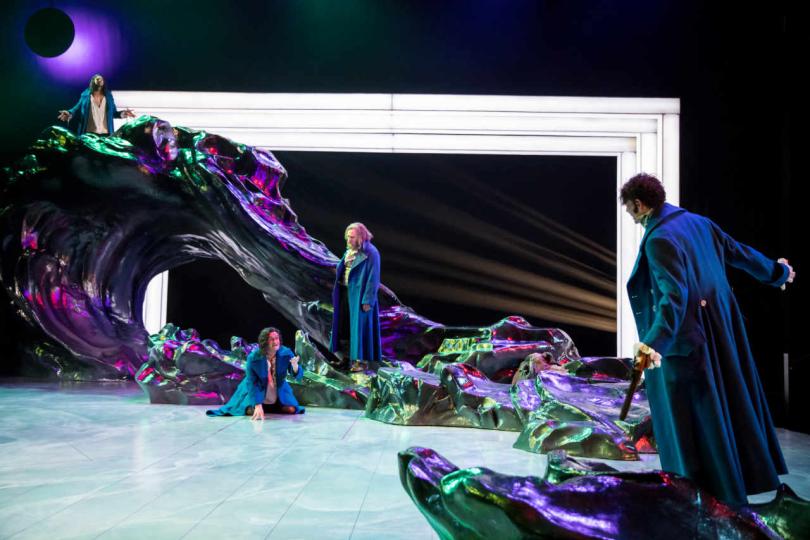Resurrecting the existential horror of Frankenstein

There is a moment in the second act of the Guthrie’s Frankenstein - Playing with Fire in which four actors share the stage wearing identical blue coats, a pointed visual detail meant to underline for us that we’re not only seeing versions of two men at different stages of their lives, but also of one man broken out into four distinct personas, and possibly also of the entire scope of mankind uniting in defiance of an uncaring creator.
So yeah, this isn’t your bolts-in-the-neck, “Fire bad!” type of Frankenstein story. This is some heavy, existential Frankensteinery that hews far closer to Mary Shelley’s original novel than to the more familiar Hollywood version. But Barbara Field’s script — originally commissioned by the Guthrie for its 1988 season — isn’t content with a mere retelling of Shelley’s classic exploration of creation and consciousness. This is a painful, penetrative reimagining wherein the laws of time, truth, and life itself are all open to interpretation.
The play’s divorce from pop culture incarnations of the Frankenstein story is evident from the moment the lights come up and we join the action not in an electrode-buzzing laboratory or some European graveyard, but on an ice floe in the Arctic Circle. Those familiar with Shelley’s text will recall that this is where the story ends, with a despondent, half-mad Dr. Frankenstein pursuing his murderous creation to the literal ends of the Earth.
Fire and ice
Field drops us into the final, mostly verbal showdown between the two men — or between the man and his monster, depending who you’re asking. The arctic set is suitably spare, with the stage dominated by a giant sweep of twisted iceberg, an appropriate reminder of how large the natural world looms over these men of decidedly unnatural science. Scenic designer Michael Locher’s ice floe also serves as a surprisingly versatile prop, with characters scrambling over its ridges, hiding between its folds, and climbing to its peak every time one of them tries to anoint himself as a god, which happens quite a lot in this Frankenstein. All the while Cliff Caruthers’s eerie, ambient score drones quietly in the background, often barely noticeable but all the more effective for its subtlety.
As Dr. Frankenstein and the creature lock into a mortal and mostly verbal struggle, we start to see their stormy history come together through flashbacks. These are staged in a style reminiscent of A Christmas Carol, with the older men watching in the wings and sometimes adding commentary as their intertwined origin story plays out before them. It’s here that the show really comes to life, with four actors playing two characters, all of them with deeply divergent conceptions of themselves and the unfortunate souls in their orbit.
Dualities and beyond
This is an actor’s showcase through and through, and the cast impresses across the board. Elijah Alexander and Zachary Fine as the older versions of the creature and the doctor, respectively, get the heaviest end of Field’s script, debating the philosophical and scientific ramifications of the latter’s existence and menacing each other with a pistol that neither truly intends to fire. Watching the deep, familial love simmer up from beneath the pair’s equally fierce hatred for each other is one of this show’s great pleasures, and Alexander and Fine drive it home with big, bold performances with some remarkable nuance embedded within.
Over on the flashback side of the story, Ryan Colbert delivers maybe the show’s most effective performance as the young Frankenstein, his boyish looks and gangly frame perfectly offsetting the raging arrogance that drives him toward his destructive creation. Colbert’s chilly yet passionate turn captures the tragic conflict of a man who is just as smart as he thinks but not nearly as wise.
Field writes the younger Frankenstein as a doomed savant who is in his depth in his lab but woefully out of it in his personal relationships with his shambling creation (a credibly bestial Jason Rojas), his naive fiancee Elizabeth (an underutilized Amelia Pedlow), and his Salieri-esque mentor/rival Krempe (a thrillingly bombastic Robert Dorfman). Krempe’s role speaks to another highlight of Field’s Frankenstein: a subtle streak of wry humor that’s notably absent from both Shelley’s novel and James Whale’s film adaptation. This is by no means a comedy, but Field’s occasional verbal jabs and hints of wordplay leaven the frequently grim proceedings and keeps the story from sinking under its own considerable weight.
While this is pointedly not exactly the story most people think of when they hear the word “Frankenstein,” it’s a powerful, unsettling production that mines the existential horror of its source material and keeps on digging until it uncovers some even more disturbing truths.




